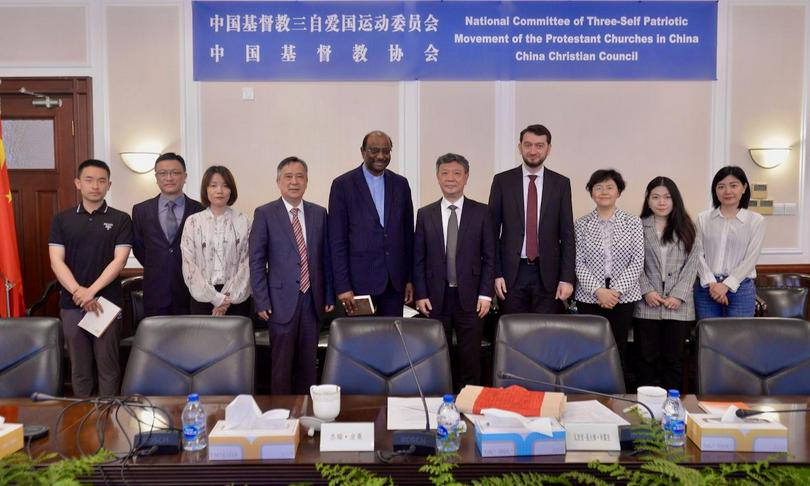World Council of Churches (WCC) general secretary, Rev. Prof. Dr Jerry Pillay is currently visiting China (23-28 May) to engage with church and religious leaders at national and regional levels in Shanghai, Nanjing, and Beijing.
He is joined by Prof. Dr Vasile-Octavian Mihoc, WCC programme executive for Ecumenical Relations and Faith and Order, on this significant visit.
Meeting with Shanghai church leaders
On 23 May, the WCC delegation met with representatives of the Shanghai Three-Self Patriotic Movement (TSPM) and the Shanghai Christian Council (CC). The delegation was welcomed by Rev. Xu Yulan, chairperson of the Shanghai Committee of the TSPM; Rev. Yu Guangzhi, chairperson of the Shanghai CC; Rev. Guo Feng, vice secretary general of Shanghai TSPM and CC; and Shi Meiying, secretary for Overseas Relations of Shanghai TSPM and CC. Discussions focused on the current state of churches in Shanghai and their collaboration with other religious stakeholders. Rev. Xu Yulan highlighted the government's support for their societal contributions, aiding impoverished individuals and students. Shanghai is home to 170 Protestant churches.
The WCC general secretary shared about the WCC's vision for the next years, especially the plans for the 1,700th anniversary of the Nicaea Council in 2025. Topics like contextual theology, ecumenical formation, post-pandemic challenges for the churches, peace, and reconciliation were at the heart of the discussions. Pillay underlined the importance of contextualisation of Christian theology in the Chinese context and invited Shanghai TSPM and CC to a closer collaboration with the WCC.
Engagement with national church leaders
On 24 May, the delegation met with the China Christian Council (CCC), represented by president Rev. Wu Wei, and the National Committee of the Three-Self Patriotic Movement (TSPM), represented by Rev. Xu Xiaohong. Other attendees included Rev. Dr Manhong Lin, CCC residential vice president and general secretary, and Jingqin Gu, CCC and TSPM interim director of Overseas Relations. The meeting emphasized the dynamic changes in China in the last decades, now the world's second-largest economy, and the successful collaboration between the state and the church to alleviate poverty.
The discussions aimed to strengthen relationships between CCC, TSPM, and WCC. Rev. Xu Xiaohong briefly recalled the history of the CCC's partnership with the WCC since it became a full member of the WCC in 1991, with special appreciation for the WCC's respect for the Three-self principle and One-China policy. Rev. Xu also highlighted the significance of the contextualisation of Christianity in China, studying the faith from this perspective, and training future generations. He also elaborated on the historical context for the further contextualisation of the faith which is now in active progress within Chinese churches. He shared that the Ecumenical Institute at Bossey has been instrumental in educating young ecumenists. The unity experienced by Chinese churches is seen as a blessing, reflecting the traditional Chinese cultural value of inclusiveness.
Rev. Wu noted that the CCC is solely affiliated to the WCC as an ecumenical organisation, fostering close collaboration over the years in having appointed representatives in governing bodies and almost all WCC commissions and in hosting commission meetings and governing bodies of the WCC. The Three-Self principle of Chinese churches—self-governance, self-support, and self-propagation of the Gospel—have played a crucial role in the growth and unity of the church since their implementation in 1950. According to Rev. Wu, the Protestant Christian community comprises approximately 38 million Christians, supported by over 12,000 ordained pastors, 40,000 full-time preachers, and 200,000 lay preachers. There are 22 seminaries and Bible schools with around 3,500 students, producing 1,100 graduates annually who serve in churches. Bible printing, including editions in ethnic minority languages and in Braille, is a priority. However, the church faces challenges such as the impact of the COVID-19 pandemic, which temporarily reduced baptisms and church attendance. Nonetheless, recent trends show a recovery in in-person worship.
The church also faces issues of secularization and commercialization of faith.
Pillay shared about the WCC's Strategic Plan, which focuses on strengthening fellowship, deepening solidarity and community, understanding mission, theological ecumenical formation, climate justice, and advocating for peace under the Pilgrimage of Justice, Reconciliation, and Unity. He emphasized the potential for collaboration with TSPM and CCC, particularly with the upcoming Nicaea 2025.
Visit to Nanjing and meeting with Jiangsu TSPM and CC
The same day, the delegation was received by Rev. Shi Li, vice chairman and general secretary of the Jiangsu TSPM and CC. He provided insights into the situation of churches in Jiangsu, where there are around 1,000 pastors and elders serving 1,400 congregations. He also discussed the Jiangsu Theological Seminary, which offers four-year undergraduate programs.
Upcoming visits and meetings
In the following days, the WCC delegation will visit the Nanjing Theological Seminary and Amity Printing Company in Nanjing as well as the State Administration for Religious Affairs, the Chinese Catholic Patriotic Association and the Bishops' Conference of Catholic Church in China, and the Chinese Islamic Association in Beijing.
The WCC delegation is accompanied by Rev Dr. Manhong Lin, CCC residential vice president and general secretary, and Xuebin Zhou, a teacher at Nanjing Union Theological Seminary.
Originally from the World Council of Churches
CCD edited and reprinted with permission












